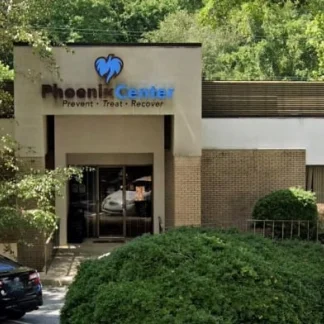Pavillion Greenville - Outpatient
Pavillion Greenville - Outpatient is a non-profit rehab located in Greenville, S...
The Phoenix Center is an addiction treatment center specializing in intervention, prevention, and treatment of substance abuse disorders. This rehab center is found in Greenville, South Carolina, and is the county's biggest provider of drug and alcohol abuse services.
The Phoenix Center can be trusted as a reliable resource and treatment facility for those struggling with drug and alcohol abuse. It is accredited by CARF, licensed by DHEC, and governed by The Greenville County Commission on Alcohol & Drug Abuse. Have a look at the following to learn about the addiction treatment programs offered at this rehab center:
This addiction treatment center’s adult outpatient treatment program provides clients with individualized treatment plans, individual and group counseling, multidisciplinary treatment pathways, family sessions, and clinical assessments.
Those enrolled in this rehab center’s OP will receive treatment at varying intensity levels to match their recovery needs. In addition, this OP has no definitive timeframe, as individuals can continue seeking help with their substance abuse issues indefinitely.
The adult residential treatment program at Phoenix Center caters to men and women aged 18 and over who require intensive substance abuse addiction treatment. Those who attend this residential program will receive six hours of treatment daily.
Additionally, patients will be introduced to community recovery support, and family involvement is encouraged throughout a patient’s stay to help with recovery and long-term sobriety.
Addiction is a hard beast to conquer, so this rehab center offers a comprehensive medication-assisted treatment (MAT) program. This MAT recognizes substance abuse as a chronic condition, which is why individuals are medically monitored 24/7 to help with detox, cravings, and withdrawal management.
To further assist, MAT offers more than counseling; it also provides medication to eligible candidates. This medication includes Subutex, Vivitrol, and Suboxone.
This addiction treatment center has ten beds dedicated to medical detox. Patients accepted to the detox treatment program at Phoenix Center will have a safe space to get through withdrawal and cravings.
The detox unit is manned by medical staff and counselors seven days a week, 24 hours a day, and the environment is welcoming, safe, and friendly. Usually, the length of stay varies, but most people will complete this program within 5 to 7 days. However, to gain entry to this program, patients will need to meet acute medical detoxification criteria and complete on-site screening.
Contact us for more information: (864) 467-3790

Connect with Phoenix Center by calling their admissions team directly.
(864) 467-3790 Website Get DirectionsThe Commission on Accreditation of Rehabilitation Facilities (CARF) is a non-profit organization that specifically accredits rehab organizations. Founded in 1966, CARF's, mission is to help service providers like rehab facilities maintain high standards of care.
CARF Accreditation: Yes
Research clearly demonstrates that recovery is far more successful and sustainable when loved ones like family members participate in rehab and substance abuse treatment. Genetic factors may be at play when it comes to drug and alcohol addiction, as well as mental health issues. Family dynamics often play a critical role in addiction triggers, and if properly educated, family members can be a strong source of support when it comes to rehabilitation.
Group therapy is any therapeutic work that happens in a group (not one-on-one). There are a number of different group therapy modalities, including support groups, experiential therapy, psycho-education, and more. Group therapy involves treatment as well as processing interaction between group members.
In individual therapy, a patient meets one-on-one with a trained psychologist or counselor. Therapy is a pivotal part of effective substance abuse treatment, as it often covers root causes of addiction, including challenges faced by the patient in their social, family, and work/school life.
Group therapy is any therapeutic work that happens in a group (not one-on-one). There are a number of different group therapy modalities, including support groups, experiential therapy, psycho-education, and more. Group therapy involves treatment as well as processing interaction between group members.
In individual therapy, a patient meets one-on-one with a trained psychologist or counselor. Therapy is a pivotal part of effective substance abuse treatment, as it often covers root causes of addiction, including challenges faced by the patient in their social, family, and work/school life.
In individual therapy, a patient meets one-on-one with a trained psychologist or counselor. Therapy is a pivotal part of effective substance abuse treatment, as it often covers root causes of addiction, including challenges faced by the patient in their social, family, and work/school life.
Pavillion Greenville - Outpatient is a non-profit rehab located in Greenville, S...
SCVRD Greenville is a private rehab located in Greenville, South Carolina. SCVRD...
The Phoenix Center is a nonprofit alcohol and drug addiction recovery facility b...
The Phoenix Center – Serenity Place is a women’s residential inpatient drug and ...